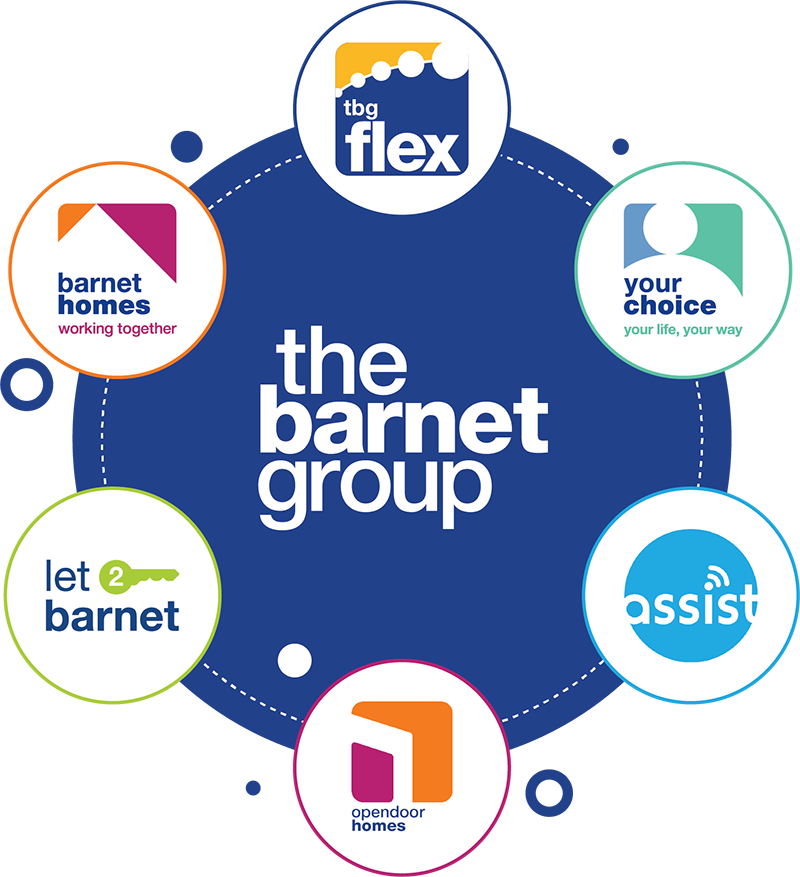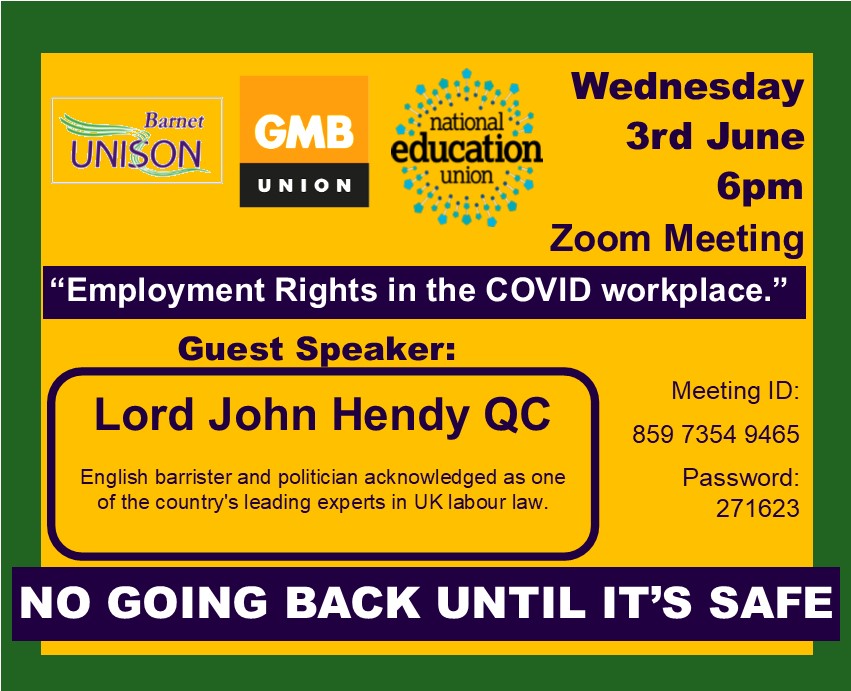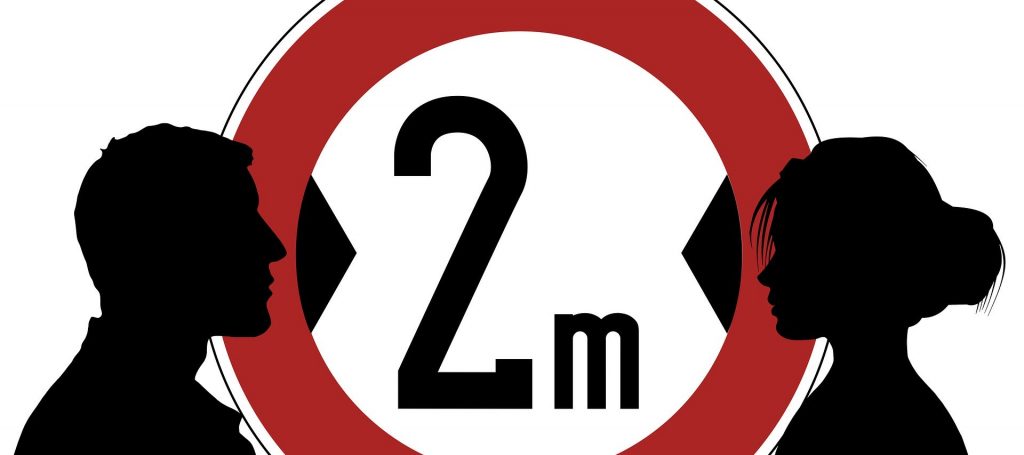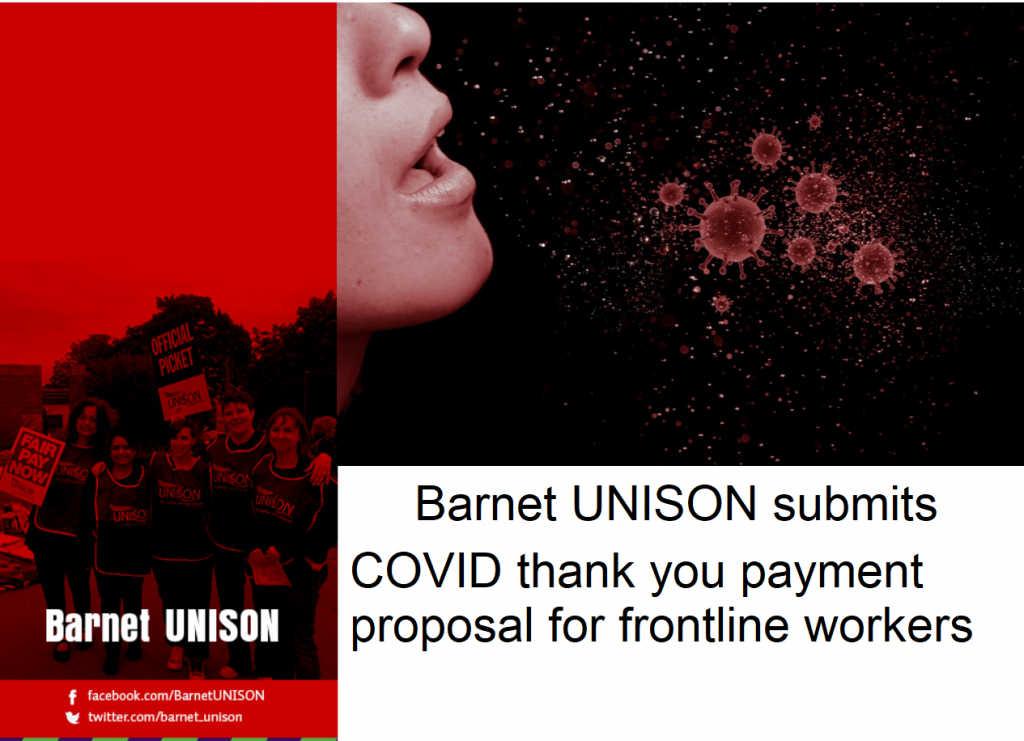Category: Your Choice Barnet
Annual General Meeting 4th March 2021, 4pm

March 4th at 4pm Time off has been requested from all employers
I don’t think we ever imagined circumstances where as trade unionists we would be facing such wide scale interventions involving potentially life or death decisions. The pressure on the whole branch, which is not an abstract thing – it’s our members and reps – has been intense and continues to be so.
Nonetheless it is you and your engagement which has enabled reps to keep on doing what they are doing and to meet with some success. There is so much more to do though…
We need you to attend our Annual General Meeting in order to make key decisions for the correct running of our branch. If we fail to meet as per rules we will fail to exist and we will not be able to continue to support you.
We have confirmed our zoom account will let in up to 500 people so there will not be a problem for those of you who wish to attend. However, this time you MUST register in advance. This is because the AGM is a member only event and for voting purposes we need to confirm those attending are our members.
You need to make sure when you attend we can identify you, therefore if you know your image in the meeting will appear with “Galaxy” or “i-phone user” rather than your name you need to change this to your real name before you enter the meeting otherwise you are likely to be denied access.
Here is a guide on how to use Zoom
If you still require assistance on how to use Zoom please contact the Branch Office by email contactus@barnetunison.org.uk
Barnet UNISON is the 2nd fastest growing branch in the Greater London region according to last year’s figures. We welcome our new members. We have also seen a much greater number of colleagues agreeing to become reps which is incredibly important. This growth has been critical in our attempts to keep us all as safe as possible. In order to keep going we need you to attend our AGM
Register in advance for this meeting:
https://us02web.zoom.us/meeting/register/tZcocOGvrjMsGtAYwZn7i5kEeqIy-PS8euKU
Breaking News: Covid Plus Joint Trade Union proposals

Dear Barnet UNISON members
The following Joint Trade Union proposals were sent to Barnet Council on Wednesday 4 November 2020.
We will update members as soon as we have a response.
UNISON National issue this statement on schools which you can view here
Joint Trade Union statement
COVID Plus. Front line workers
For the purposes of this proposal frontline means workers who cannot work from home.
- All staff who are deemed clinically vulnerable or extremely clinically vulnerable to stay at home for lockdown on full pay.
- All frontline staff to receive a monthly COVID payment for the duration of the Pandemic in recognition of the important role they playing in the provision of frontline services and the simple fact frontline workers can’t work from home and have to bear the costs of travel and navigate the risks of travel on public transport.
- All frontline workers to have weekly COVID tests.
- All frontline workers to receive full pay if they have to isolate or are unable to work due to COVID.
- All frontline workers to have unlimited access to counselling services during this pandemic in recognition of the mental stress working with COVID brings to this workforce.
- If staff have to work from home due to fact their children are sent home from their school due to COVID then they should remain on full pay.
- All COVID related absences whilst recorded should not be used for sickness absence recording.
- Any staff having to make emergency visits abroad to visit a dying relative or attend a funeral should receive full pay during the quarantine period.
COVID Plus for home workers.
- All staff who are deemed clinically vulnerable or extremely clinically vulnerable to stay at home for lockdown on full pay.
- All workers to have unlimited access to counselling services during this pandemic in recognition of the mental stress working with COVID brings to this workforce.
- If staff have to work from home due to fact their children are sent home from their school due to COVID then they should remain on full pay and it should be recognised that the worker has a reduced capacity to carry out their work duties.
- All COVID related absences whilst recorded should not be used for sickness absence recording.
- Any staff having to make emergency visits abroad to visit a dying relative or attend a funeral should receive full pay during the quarantine period.
- To recognise the damaging effect working from home has on both physical activity levels and mental health. Also to recognise that the normal practice of leaving home to travel to and from work also of travelling between venues for meetings are now lost to the home worker leading to a more compressed working routine with little opportunity to leave the home. Therefore give a one hour paid daily break to home working staff in addition to their lunch break to enable them to have down time from their computer screens and so that they can physically leave their home for a walk or partake in some form of exercise.
- Protocol for structuring virtual meetings to enable time away from the screen e.g. starting meetings at quarter past the hour implying that there should be a 15min break before the meeting starts.
- Supervision to incorporate questions relating to mental health wellbeing and physical health as well as checking on the home set up (it should not be assumed home set up is constantly the same).
- For a designated person to randomly contact 10 workers per week to find out from them their experience with respect to supervision, welfare checks etc.
- Staff with children at home should be given a designated amount of time to dedicate to their child’s learning and leisure.
- Key workers working from home who have a clinically or extremely clinically vulnerable child should be allowed to continue working from home if schools are closed but only open to key worker’s children.
Stay safe
Best wishes
John Burgess
Branch Secretary
Barnet UNISON.
Pay Rise for Some – NOT for others? Must be The Barnet Group

UNISON been informed that if you are a Barnet Homes Contracted member of staff that you should receive the 2.75% nationally agreed pay rise in your October pay – this will be backdated to April 2020.
If you are a TBG Flex Contracted member of staff working in Barnet Homes – the pay rise your Barnet Homes colleagues receive as part of their Nationally agreed Pay and Terms and Conditions, will be brought to the TBG Flex Board for hopeful approval the next time it sits – IF AGREED by the Board you will receive the 2.75% increase, which should be back dated to April – As yet UNISON has not been notified as to when the TBG Flex Board will meet to make this decision.
If you are a TBG Flex member of staff working for Your Choice Barnet – The Barnet Group have informed UNISON that you will NOT receive any Pay Rise.
If you are a Your Choice Barnet contracted member of Staff – The Barnet Group have informed UNISON that you will NOT receive any Pay Rise.
If you are a Your Choice Care [ex Fremantle] contracted member of staff – The Barnet Group have informed UNISON that you will NOT receive any Pay Rise.
UNISON is waiting for The Barnet Group to advise UNISON on whether staff in Your Choice Care will receive the London Living Wage as a minimum.
This highlights the shocking discrepancies in Pay and Terms and Conditions in the Barnet Group – WE ALL ultimately work for the London Borough of Barnet – WE SHOULD ALL be on Nationally Agreed Pay and Terms and Conditions with access to the Local Government Pension Scheme and a standard 36hr week.
Please, please, talk to your colleagues about the Pay inequality in The Barnet Group and get them to join Barnet UNISON –
HELP US HELP YOU TO FIGHT FOR EQUAL PAY AND TERMS AND CONDITIONS IN THE BARNET GROUP!!!!!

When is a Council Worker not a Council Worker?
When is a Council Worker not a Council Worker?
The Barnet Group is a Local Authority Trading Company [LATC] fully owned and funded by the London Borough of Barnet to provide Housing and Care Services on behalf of Barnet Council to Barnet Residents.
Barnet Homes Contracted staff [pre 2016] – Have nationally agreed Terms and Conditions and access to the Local Government Pension Scheme.
Your Choice Barnet [YCB] Contracted staff – were forcibly opted out of nationally agreed pay which included a 9% cut to their wages.
YCC – Your Choice Care – consists of staff [many of them originally LBB employees] TUPE into the Barnet Group are not even paid the London Living Wage.
TBG FLEX – an employment company within the Barnet Group – Was initiated in 2016 to drive down T&Cs for new starters working for Barnet Homes and Your Choice Barnet.
It has been a success!!!

FAT CAT PROFITS
TBG Flex employees have:
No access to the Local Government Pension Scheme. [But do have access to a much inferior pension scheme….Thanks!]
Work longer hours that their colleagues in Barnet Homes or LBB.
Are paid less than colleagues in Barnet Homes or LBB.
Have less Annual Leave than colleagues in Barnet Homes or LBB.
Have no continuation of service should they wish to work for another Local Authority.
YCB workers and TBG Flex contracted workers in YCB or YCC have the added bonus that they do not even get the cost of living yearly increase which TBG Flex contracted staff receive in Barnet Homes.
So when is a Council Worker not a Council worker?
When they work in the Barnet Group in YCB or YCC or have a TBG Flex Contract
THAT’S WHEN!
Help us to stamp out the inequality in the Barnet Group
Join us in campaigning for all Barnet Group staff to have access to the Local Government Pension Scheme, have the same pay and grading, sick pay, annual Leave and Terms and Conditions as our colleagues in Barnet Homes.
JOIN UNISON
HAVE YOUR VOICE HEARD!!!!
“IMPORTANT Update: Guidance and template letter for vulnerable employees (England)”

28 May 2020.
Please read the latest guidance provided by UNISON
This guidance covers:
1 Clinically extremely vulnerable employees (people at high risk)
2 Clinically vulnerable employees (people at moderate risk)
3 Employees living with / caring for the vulnerable or extremely vulnerable
4 Black employees
5 Older employees (over 60)
6 Employees who have childcare responsibilities
7 Employees who are feeling anxious about returning to work
8 Template letter to head teacher
Click on the link to read the guidance
If you need any help with this advice please contact the branch office at contactus@barnetunison.org.uk
“Employment Rights in the COVID workplace.”

Joint Trade Union Zoom meeting
“Employment Rights in the COVID workplace.”
Wednesday 3 June at 6pm
Guest Speaker Lord John Hendy QC
https://us02web.zoom.us/j/85973549465?pwd=SDBKVkM0RXU0Wmd2Sjk1VGFpVE5BQT09
Meeting ID: 859 7354 9465
Password: 271623
Breaking News: Barnet UNISON ending Lockdown survey results

We asked our members (most of whom are working from home) one question.
“Do you feel that it is safe for you to go back to work?”
94% of our School UNISON members felt it was not safe.
85% of our Capita UNISON members felt it was not safe.
79% of our Barnet Council UNISON members felt it was not safe.
79% of our Barnet Homes members felt it was not safe
TBG FLEX Pension Deductions

Barnet UNISON are receiving reports that there have been incorrect deductions to TBG Flex staff pensions – please – check your payslip and if you think something is amiss, email the Branch office ASAP.
contactus@barnetunison.org.uk
Barnet Group – temporary-changes-to-workplace-policies-and-procedures
Barnet Group -COVID-19 – temporary-changes-to-workplace-policies-and-procedures
As coronavirus (also known as COVID-19) continues to spread, we recognise that our organisation needs to adapt its ways of working.
We want to help reduce the spread of coronavirus and safeguard the welfare of our staff during the coronavirus outbreak, while continuing our operations as normally as possible.
This policy explains what temporary changes we are making to our usual policies and procedures on sickness absence, flexible working, travel, and annual leave during the global health crisis.
Sickness absence
Sickness absence reporting
What is our normal policy?
Under our normal sickness absence policy, if you fall ill and cannot attend work, you would be required to:
- notify your line manager before you are due to start work, or as soon as possible if that is not practical; and
- provide medical evidence (typically, a fit note from your doctor) for sickness of more than seven calendar days’ absence.
What is changing temporarily?
During the coronavirus situation, it is vital that you do not attend work if you fall ill and experience any common coronavirus symptoms. These are:
- a fever;
- a dry cough; and
- shortness of breath.
You should still notify your line manager of your absence before you are due to start work, or as soon as possible if that is not practical.
However, we recognise that you may be legitimately absent without having written medical evidence (typically, a fit note from your doctor). If you are given medical advice to self-isolate, we will not ask you to provide written medical evidence after seven calendar days’ absence.
This is because public health advice is that, if you show symptoms, you should avoid going to your doctor or a hospital to prevent infection from spreading. You may have been given medical advice via telephone from NHS 111 to self-isolate.
You will still be expected to:
- explain to your line manager what medical advice you have been given and from whom; and
- keep in regular contact with your line manager.
Given the coronavirus situation, you must make sure that your contact details are up-to-date on iTrent and your line manager has a telephone number and email address where they can reach you if you are in self-isolation.
Acceptable levels of absence
What is our normal policy?
Under our sickness absence policy, the formal procedures for managing sickness absence may be triggered as a result of:
- 10 or more working days of sickness absence during a rolling 12 month period;
- 4 or more episodes of sickness absence during a rolling 12 month period;
- a single absence of 15 or more working days (long-term sickness absence);
- any sickness that gives cause for concern or where early intervention might help.
in the previous 12 months.
What is changing temporarily?
If you are given medical advice to self-isolate (for example from NHS 111), or we ask you to self-isolate, we will not take this absence into account when determining whether or not we are taking formal action under our sickness absence management procedure.
Sick pay
What is our normal policy?
You would normally receive, if eligible, statutory sick pay (SSP) where:
- you have a period of sickness absence from work of at least four calendar days in a row; or
- during sickness absence you are normally entitled, in any 12-month period to receive sick pay as defined in your contract which would reduce to half pay or no pay
What is changing temporarily?
You will be paid full pay if:
- we have asked you to stay away from the workplace and self-isolate; or
- you are self-isolating in response to medical advice from NHS 111, your doctor, or a local health protection team.
Flexible working
Requests for flexible working
What is our normal policy?
Under our flexible working policy, you can normally agree informally with your line manager to one-off or short-term changes to your working patterns or periods of homeworking.
However, if you wish to change your working patterns or work from home for an extended period, we normally ask you to make a formal request for flexible working and follow the procedure set out in our policy on employees requesting flexible working.
What is changing temporarily?
As long as the organisation’s operational needs continue to be met, you will be able to:
- adapt your working patterns, for example to allow you to travel on public transport at less crowded times; or
- work from home if your role allows for this,
for an extended period without having to follow our formal procedure. You can agree informally with your line manager to these changes.
You should speak to your line manager if you wish to take advantage of either of these options, or any other flexible working options that may help you at this time. However, the decision as to whether or not to agree to your request for flexible working remains with your line manager.
Once agreed, the temporary flexible working arrangement will continue until further notice. If circumstances change, your manager will discuss with you any adaptations to, or the withdrawal of, the flexible working arrangement, with the final decision remaining with your manager.
Requirement to work remotely
What is our normal policy?
Except by prior agreement with us, we do not normally require you to work remotely for an extended period.
There is normally no expectation that:
- if you use a laptop, you always take it home with you after work each day.
What is changing temporarily?
Given the current global health situation, you may be asked to work remotely at short notice. This could be the case if our workplace closes unexpectedly as a precaution or public health measures, such as an area-wide lockdown, are introduced.
This could mean working from home, although you may have the option to work remotely from one of our other work sites if it remains open.
If it is not possible for you to work from home, you should discuss your options with your line manager.
You should ensure that, where possible, you take your laptop home with you after work each day.
You should contact the IT department if you have any queries about the remote-working system.
Travel
Non-work-related travel
What is our normal policy?
We do not normally have any rules around staff travelling outside work.
What is changing temporarily?
If you have been in a restricted area since the beginning of March 2020, you must inform your line manager immediately.
If you plan to travel to a restricted area in your own time, for example on a holiday or for family reasons, you must inform your line manager before you depart of where you are going.
You must not come to work on your return. Even if you have no symptoms, we will ask you to self-isolate for 14 days after your return from the restricted area.
On your return from a restricted area, your first step should be to visit the 111.nhs.uk website, where you can get further medical advice via telephone. You should do this even if you do not have any symptoms.
If possible, you should avoid going to your doctor or a hospital to prevent infection from spreading.
Annual leave
Changing your holiday plans
What is our normal policy?
Once you have booked annual leave, we normally allow you to cancel or change annual leave only in limited circumstances. These circumstances include where:
- your personal circumstances warrant it and the cancellation or change does not inconvenience the organisation; or
- you fall ill shortly before or during annual leave.
What is changing temporarily?
During the coronavirus situation, you may change your mind about travelling, or be unable to travel to your planned destination, and may wish to cancel or change annual leave that you have already booked.
If you would like to cancel or change planned leave, please speak to your line manager. We may allow you to change or cancel booked holiday, taking into account the coronavirus situation. However, this will continue to be a decision for your line manager, depending on the circumstances.
For example, if we have arranged cover for you, or arranged shift patterns on the basis that you will be on leave, we may require you to take the leave as booked.
Unused annual leave
What is our normal policy?
Our organisation’s holiday year runs from 1 April to 31 March.
Normally, we require you to take your holiday entitlement in the relevant holiday year and we allow you to carry over no more than[five days’ annual leave into the following leave year.
What is changing temporarily?
We recognise that you may be unable to take your remaining annual leave before the end of the leave year. For example, you could have an increased workload because of the coronavirus situation, or you may have cancelled or changed planned annual leave.
We are suspending our usual rule that / you can carry over no more than five days’ annual leave into the following leave year
While you should endeavour to take your holiday entitlement in the relevant holiday year, you should speak to your line manager if you think that you will be unable to do so.
As long as your line manager agrees, the annual leave can be taken later. The timing is a matter for discussion between you and your line manager.


